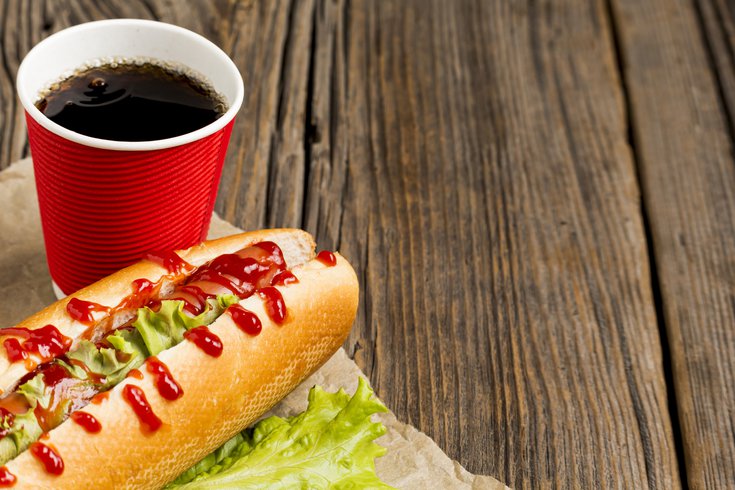
February 02, 2023
 Source/Image licensed from Ingram Image
Source/Image licensed from Ingram Image
Ultra-processed foods include soft drinks, chips, chocolate, candy, ice cream, sweetened breakfast cereals, chicken nuggets, hot dogs, french fries and packaged soups. A new study links them to increased cancer risk.
The dangers of eating too many ultra-processed foods are well-established, but many U.S. adults still consume diets high in these foods, which often have poor nutritional value.
Ultra-processed foods are heavily manufactured and loaded with additives, artificial flavors, colors, sweeteners and preservatives. Basically, the taste, texture and appearance of natural ingredients are transformed. They include everything from breakfast cereals and flavored yogurts to frozen pizzas and ready-to-eat meals to hot dogs and sodas.
Other foods also are processed, but not to the same extent. Cheese, salted peanut butter and pasta sauce all go through some processing, but it is more limited.
Studies have linked ultra-processed foods to heart disease, obesity, high blood pressure, type 2 diabetes and certain types of cancer including colon, ovarian and breast cancers. Though causation is hard to prove, research consistently shows a strong relationship between heavily manufactured food products and poor health. It remains unclear if the driving force is the nutritional deficiencies associated with these foods or the presence of the added chemicals.
A new study, from Imperial College London, found that ultra-processed foods may increase the risk of developing cancer, particularly ovarian and brain cancers.
These foods also are associated with an increased risk of dying of cancer, particularly from breast and ovarian cancers. Breast cancer is the second-leading cause of cancer death in women; ovarian cancer ranks fifth. The American Cancer Society estimates that the cancers will kill 43,700 and 13,270 people, respectively, this year.
"Although our study cannot prove causation, other available evidence shows that reducing ultra-processed foods in our diet could provide important health benefits," said Eszter Vamos, the study's lead author. "Further research is needed to confirm these findings and understand the best public health strategies to reduce the widespread presence and harms of ultra-processed foods in our diet."
The study, published online by The Lancet, evaluated the diets of nearly 200,000 middle-aged adults for a 10-year period in the United Kingdom. For every 10% increase in ultra-processed foods in a person's diet, the risk of developing cancer increased by 2%. The risk for developing ovarian cancer jumped by 19%.
The relationship between ultra-processed food and cancer was still significant even after the researchers adjusted for factors such as smoking, physical activity and body mass index.
The underlying mechanisms of how these foods contribute to cancer risk is not well understood, but some studies have suggested that the result of cancer-causing agents being added to the foods or created during the manufacturing process is a factor.
One study found a link between acrylamide, an industrial chemical that is formed under high cooking temperatures, and ovarian cancers. Another study found that people who ate a lot of ultra-processed foods had a 19% higher likelihood of early death and a 32% higher risk of dying from heart disease, compared to people who ate only a little bit of ultra-processed foods.
The Imperial College London researchers said manufacturing reforms are needed, including clearer labeling and packaging, which would help consumers make healthier choices. They also called for improved access to fresh, healthy food options.
In the U.S, almost 60% of the calories that adults consume are from ultra-processed foods. Why do people so often grab ultra-processed food instead of healthier options?
Experts cite a combination of factors. These foods are often less expensive than healthier foods and more convenient. Plus, the taste is perfected through the manufacturing process.
Some ultra-processed foods are heavily marketed as healthy options, which can be confusing for consumers. Even these seemingly healthy ultra-processed food products are higher in salt, fat and sugar than whole foods and they contain artificial additives.
"Lower income households are particularly vulnerable to these cheap and unhealthy ultra-processed foods," said Kiara Chang, a researcher from Imperial College London. "Minimally processed and freshly prepared meals should be subsidized to ensure everyone has access to healthy, nutritious and affordable options."
The NOVA classification system can help people distinguish between ultra-processed foods and those with only minimal processing. Developed by an international panel of food scientists and researchers, it places foods into one of four categories – unprocessed, processed culinary ingredients, processed and ultra-processed.
Unprocessed or minimally-processed foods include vegetables, grains, legumes, fruits, nuts, meats, seafood, herbs, spices, garlic, eggs and milk. The majority of one's diet should be made up of these foods.
Processed culinary ingredients are derived by pressing, refining, grinding or milling. They are typically not eaten on their own but used to prepare minimally-processed foods. Examples include oils from plants, seeds and nuts, and flour and pastas formed from whole grains.
Processed foods are foods in which oil, sugar and salt are added. They generally are packaged. Examples include bread, cheese, tofu, canned tuna and beans. These foods often only include two to three ingredients.
Ultra-processed foods are those that have gone through multiple processes like extrusion, molding and milling. They contain many added ingredients. Examples include soft drinks, chips, chocolate, candy, ice cream, sweetened breakfast cereals, chicken nuggets, hot dogs, fries and packaged soups.
The experts at Heart & Stroke encourage people to devote more time to preparing home-cooked meals with fresh ingredients. They advise people to enjoy meals with friends and family members instead of scarfing down fast food in front of the television. Research has shown that people who dine together have healthier eating habits.